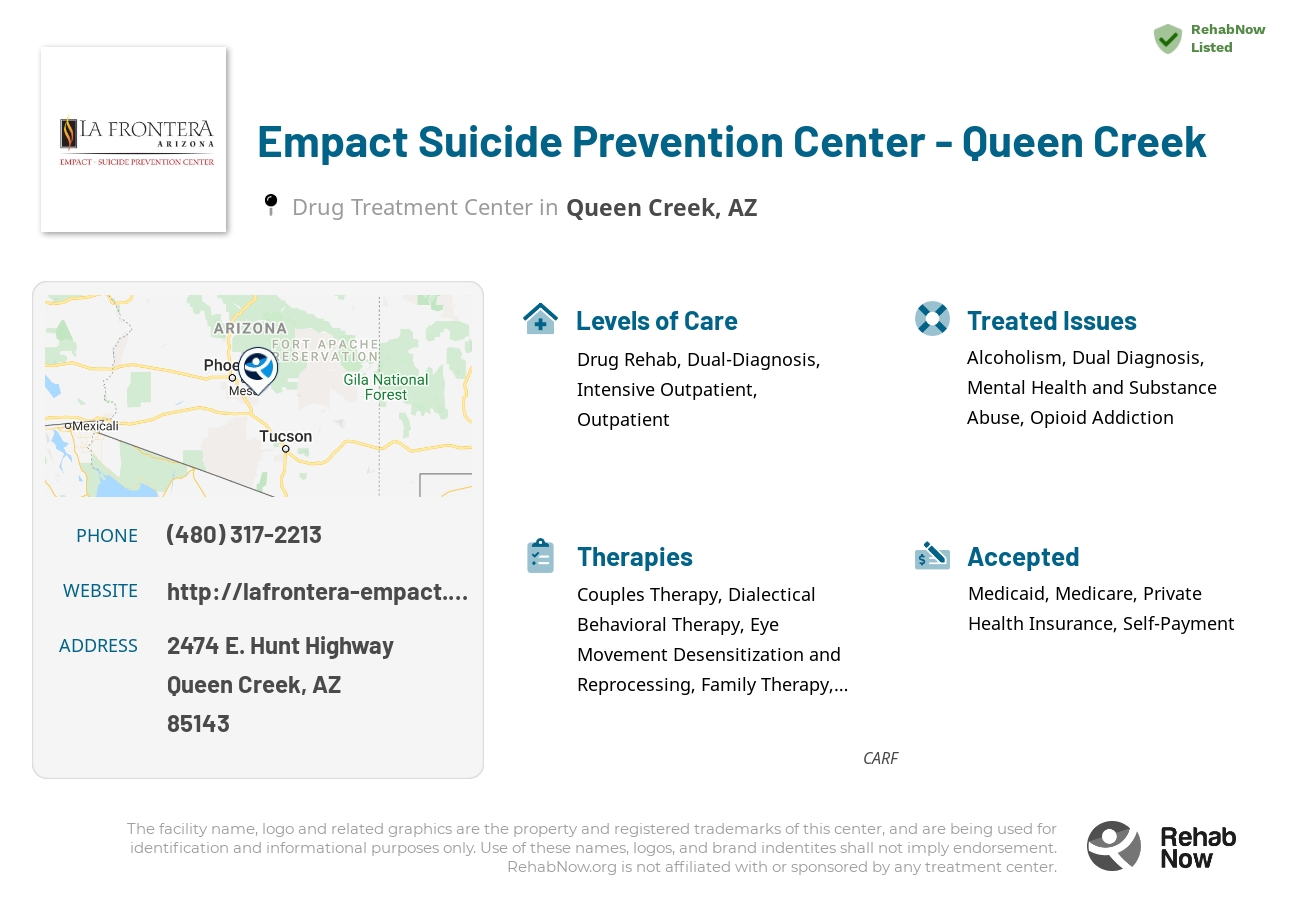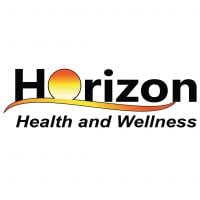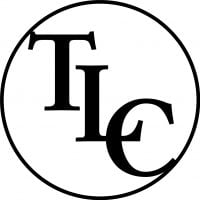Empact Suicide Prevention Center - Queen Creek
Drug Rehab Center in Queen Creek, Arizona
Empact Suicide Prevention Center in Queen Creek, Arizona specializes in treating substance abuse and mental health disorders, offering various levels of care and evidence-based treatment programs, including individual, group, and family therapy, medication management, and holistic therapies, as well as crisis support and referrals to other resources.
About Empact Suicide Prevention Center - Queen Creek in Arizona
Empact Suicide Prevention Center, located in Queen Creek, Arizona, stands out for its dedicated approach to mental and behavioral health care. Catering to a diverse clientele, including the LGBTQ+ community and Spanish-speaking individuals, this facility specializes in services for those managing addiction alongside mental health challenges. Its focus on comprehensive, personalized care across various programs makes it a unique resource for recovery.
- Specialized Support for Diverse Needs: Offers targeted programs for children, adolescents, LGBTQ+ individuals, and Spanish speakers.
- Comprehensive Care Approach: Includes crisis intervention, patient stabilization, and a continuum of outpatient care designed for various stages of recovery.
- Evidence-Based Treatment: Utilizes dialectical behavioral therapy (DBT) and eye movement desensitization and reprocessing (EMDR) in its treatment plans.
Empact Suicide Prevention Center is accredited by CARF, ensuring a high standard of care. Their programs, including intensive outpatient and general outpatient, are tailored to meet the evolving needs of those in recovery, emphasizing both medical and mental health support. The center accepts many major insurance providers and offers financial assistance, making it accessible to a broad audience.
The facility addresses a wide range of addictions and co-occurring mental health issues, such as alcoholism, opioid addiction, and dual diagnoses. Treatment methods encompass individual, group, and family therapy, alongside medication management and holistic therapies, within their comprehensive levels of care, including intensive outpatient and aftercare programs.
Genders
Ages
Modality
Additional
Accreditations

CARF
The Commission on Accreditation of Rehabilitation Facilities (CARF) is a non-profit organization that specifically accredits rehab organizations. Founded in 1966, CARF's, mission is to help service providers like rehab facilities maintain high standards of care.
Conditions and Issues Treated
Opioid addiction is when someone becomes addicted to opioids. This can happen quickly due to any opioid use. Opioid withdrawal can be uncomfortable and lead the user to continue using even if they want to quit. It’s best to receive inpatient treatment for detoxification.
Even if a person doesn’t need inpatient treatment, it’s recommended to start rehabilitation or at least some kind of outpatient treatment. This is because the withdrawal symptoms from opioids can be uncomfortable and unpleasant, to the point that a person could end up using again or worse.
Detoxification should be done to break the physical addiction of opioids. This can be done with opioid replacement therapy, medication-assisted therapy, or a more traditional detoxification program. Intensive outpatient treatment is a form of addiction care that allows patients to continue living at home while undergoing treatment. This type of care is appropriate for patients who have been treated in residential treatment programs. Intensive outpatient programs include regular visits to the facility providing therapy, and patients gradually return to their routine life. IOP benefits most when patients have a supportive family member or friend to help them recover.
The first step to getting into an intensive outpatient program is to attend a detoxification facility. Detoxification facilities are designed to remove substances from the body safely. The patient will attend sessions designed to help them understand their addiction and its impact on their lives. While in an intensive outpatient program, therapy sessions are scheduled three to five times per week, with the patient attending no more than two sessions in one day.
Dual Diagnosis therapy is considered more successful than traditional rehab methods because it treats the addiction and the underlying mental health disorder simultaneously. This comprehensive approach gives Queen Creek, AZ patients the best chance for long-term recovery. If the patient does not receive treatment for both conditions, they are more likely to relapse.
Levels of Care Offered
This center offers a variety of custom treatment tailored to individual recovery. Currently available are Drug Rehab, Dual-Diagnosis, Intensive Outpatient, Outpatient, with additional therapies available as listed below.
An intensive outpatient treatment program, or IOP, is set up for those struggling with an addiction to begin the recovery process. However, the patient will not live at the facility during treatment.
IOP involves patients coming in and out of a medical office building regularly to receive therapy and other services while continuing their life outside of these visits.
IOP is a step up from drug detoxification or alcohol detox. However, it’s still considered a phase of recovery rather than the ultimate goal. There are many rehabs and treatment facilities available to patients in need of IOP.
Outpatient treatment consists of counseling and therapy sessions. The outpatient treatment process begins with the addict’s initial detox period, lasting about ten days. Outpatient treatment is used for those who are at moderate risk for “slipping back” into the addiction. It is also used for those who are not currently experiencing any side effects from withdrawal, can handle social pressure, have a stable living environment, and have a good support system.
Therapies & Programs
Individual Therapy is a crucial component of addiction recovery. Therapists work with patients to identify the root of their addiction and figure out how to better handle the issues that led to them using drugs. Individual Therapy is one on one sessions where people meet with their therapist. Individual therapy provides a safe space for people to open up and discuss personal and sensitive topics which they may not feel comfortable discussing in a group setting.
In this type of therapy, therapists can develop specific solutions for each patient, which helps speed up their recovery process. In addiction recovery, therapy is a crucial part. It allows patients to go deep into their core issues and discover how those problems can be better handled now. Therapy can be performed in individual sessions as well as group settings. In individual therapy for addiction, the patient meets with the therapist one-on-one to focus on the underlying issues of addiction and come up with solutions to prevent future abuse.
Addiction can take a heavy toll on relationships, damage the trust and intimacy that was once there. Couples therapy at Empact Suicide Prevention Center - Queen Creek helps to rebuild the trust and intimacy that has been damaged. An intimate relationship with a drug addict is not healthy for children or anyone in the family. Therapist help to rebalance family roles and create a healthier environment after rehab in Queen Creek, AZ.
Family therapy is a crucial part of drug treatment and getting sober. It is one of the most effective ways to help addicts stay on the path to long-term sobriety. One of the most important parts of family therapy is the relapse prevention plan. During treatment, therapists and doctors will often sit down with the addict and their family to develop a plan if the addict ever feels like they want to use again. This plan should involve steps the addict and family can take together to prevent them from relapsing in the future.
An addict’s family can play a vital part in helping them to avoid relapse because they can spot the warning signs and help them get back on track before it becomes too much of a problem. Family therapy is one of the most effective ways to help addicts stay on the path to long-term sobriety.
Group Therapy is employed by drug treatment centers like Empact Suicide Prevention Center - Queen Creek to provide the recovering addict with a platform to talk about their feelings and experiences. It also provides for an opportunity to learn from other addicts who have successfully overcome their addiction. It is recommended that all group members be recovering addicts for this type of therapy to work.
This type of therapy involves the use of a variety of therapeutic techniques to help addicts recover from past traumas that might have triggered their substance abuse. During these sessions, therapists will work with the addict to address painful memories and learn how to cope effectively with stressors as they arise.
During these types of sessions, therapists will typically focus on three main goals:
- Identifying and expressing painful emotions associated with past traumas.
- Reducing the effects of stress on an addict’s life by developing more effective coping mechanisms.
- Developing healthy ways of thinking about stressful situations that can help addicts avoid substance abuse issues in the future.
This type of therapy is typically used in conjunction with other types of addiction treatment services. By identifying and dealing with the root cause of addiction, most addicts can overcome their cravings and prevent relapse once they leave rehab.
Many different types of addiction treatment services exist to help addicts safely get sober, but it’s important for recovering individuals to find a therapist or support group that will help them address the root cause of their addiction.
Dialectical behavior therapy (DBT) is a type of cognitive behavioral therapy that is focused on helping those with problematic behaviors caused by intense emotions and thoughts control and regulate their emotions and behavior.
Dialectic Behavior Therapy is beneficial for:
- People who have chronic suicidal thoughts and behaviors
- People who have chronic drug cravings
- People who have difficulty establishing and maintaining personal relationships
- People who have a mental disorder such as Borderline Personality Disorder
- People who have experienced trauma in their life
EMDR helps patients deal with past events. The Empact Suicide Prevention Center - Queen Creek This method also boosts healing which calms many allowing one to feel more in control when fighting addiction. EMDR is a therapeutic method that uses hand tapping or moving visual stimuli to provide stimulus to people recounting traumatic events.
Payment Options Accepted
For specific insurance or payment methods please contact us.
Is your insurance accepted?
Ask an expert, call (888) 674-0062
Empact Suicide Prevention Center Associated Centers
Discover treatment facilities under the same provider.
- Empact Suicide Prevention Center - Maricopa in Maricopa, AZ
- Empact Suicide Prevention Center - Glendale in Glendale, AZ
- Empact Suicide Prevention Center - Apache Junction in Apache Junction, AZ
- Empact Suicide Prevention Center - South 52nd Street in Tempe, AZ
- Empact Suicide Prevention Center - South Madison Drive in Tempe, AZ
Learn More About Empact Suicide Prevention Center Centers
Additional Details
Specifics, location, and helpful extra information.
Queen Creek, Arizona 85143 Phone Number(480) 317-2213 Meta DetailsUpdated April 15, 2024
Staff Verified
Empact Suicide Prevention Center - Queen Creek Patient Reviews
There are no reviews yet. Be the first one to write one.
Queen Creek, Arizona Addiction Information
Arizona has some of the highest rates of prescription drug abuse in the United States. Methamphetamines, heroin and morphine are among the most commonly abused substances. Prescription pain relievers were prescribed to 348 million people in 2012, enough to medicate every adult in Arizona for 2 full weeks. The number of people with substance use disorders in Arizona has remained relatively constant over the past few years.
Treatment in Nearby Cities
- Buckeye, AZ (62.5 mi.)
- Phoenix, AZ (37.6 mi.)
- Surprise, AZ (58.6 mi.)
- Safford, AZ (108.4 mi.)
- Gilbert, AZ (20.7 mi.)
Centers near Empact Suicide Prevention Center - Queen Creek
The facility name, logo and brand are the property and registered trademarks of Empact Suicide Prevention Center - Queen Creek, and are being used for identification and informational purposes only. Use of these names, logos and brands shall not imply endorsement. RehabNow.org is not affiliated with or sponsored by Empact Suicide Prevention Center - Queen Creek.









